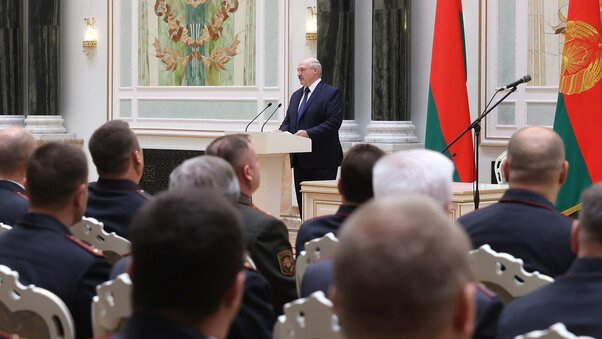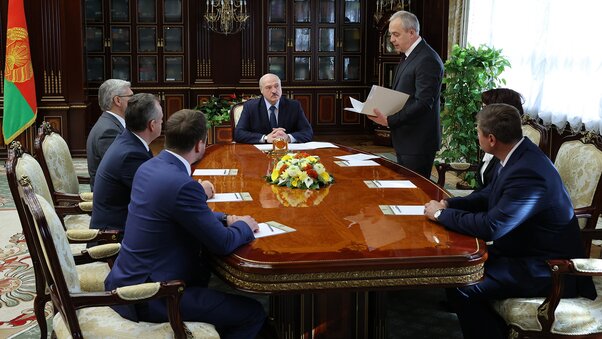Belarus President makes new appointments
- 11
- 3
Belarus President Aleksandr Lukashenko made new appointments on 19 November.
The head of state appointed:
Anatoly Markevich – Culture Minister;
Yuri Nazarenko - First Deputy Minister of Internal Affairs - head of the public security police;
Nikolai Karpenkov - Deputy Minister of Internal Affairs - Commander of Interior Troops;
Andrei Lyubimov - Head of the Vitebsk Oblast Internal Affairs Department;
Yuri Senko – Ambassador Extraordinary and Plenipotentiary of Belarus to China;
Andrei Ravkov – Ambassador Extraordinary and Plenipotentiary of Belarus to Azerbaijan;
Aleksandr Konyuk – Ambassador Extraordinary and Plenipotentiary of Belarus to Armenia;
Andrei Metelista – Ambassador Extraordinary and Plenipotentiary of Belarus to Pakistan;
Pavel Vzyatkin – Ambassador Extraordinary and Plenipotentiary of the Republic of Belarus to the Republic of Kenya with concurrent accreditation to the United Republic of Tanzania, the Republic of Uganda, the Federal Democratic Republic of Ethiopia; Permanent Representative of Belarus to the African Union, the UN Environment Program (UNEP) and the UN Human Settlements Program (UN-Habitat);
Yelena Kukharevich – First Deputy Chairperson of the National Statistics Committee;
Natalya Tarasyuk – Deputy Chairperson of the National Statistics Committee.
The head of state explained his unconventional decision to appoint someone from a different sphere of activities as Belarus’ culture minister.
Aleksandr Lukashenko noted that the decision had been unconventional for him. “It is probably the first time I’ve abandoned the principle of appointing a professional from an appropriate circle to this position,” he said. “Why does it look like the appointment of an outsider? I respond to needs of cultural workers. Many of them have expressed their desire to see a person from the outside in this position, they’ve said let’s try to appoint a person from outside our circle.”
According to Aleksandr Lukashenko, he took to heart the opinion that a manager should be put in charge of the Culture Ministry. “He knows nobody. Every person is equal to him but he understands that culture and people of culture are the super elite of our society,” the Belarusian leader said.
The fact that Anatoly Markevich has worked a long time in executive positions in municipal authorities was one of the arguments in favor of his appointment. Aleksandr Lukashenko remarked: “I thought he knows well what culture is all about because he has worked as the head of a district administration and had to take care of culture for a long period of time. He was also trained as a pedagogue. A pedagogue is a person that can work in any position,” Aleksandr Lukashenko noted.
The head of state drew attention to the responsibility the new culture minister bears and to the important tasks he faces, including the resolution of the situation in the Yanka Kupala National Academic Theater.
“Let’s talk about the matter of the Yanka Kupala theater as an example. Everything will go away. You and I will go, will lose our positions of power and will die but this disgusting page will stay for the entire life. A national theater! I am not sure whether you remember when your father worked [Vladimir Ryzhenkov is the father of First Deputy Head of the Belarus President Administration Maksim Ryzhenkov], we even often discussed this problem: a theater became a toilet, there was a toilet just outside the presidential administration,” Aleksandr Lukashenko reminded. “I thought: it is impossible for a toilet to exist, for the Yanka Kupala theater to become a toilet in the very center of Minsk under the oversight of the previous governments. As a calm person, who is no nationalist but a complete internationalist, I decided to fix the situation because the national theater is part of the country’s image. I did everything to make the theater look good. It was my dream. I kept an eye on personnel appointments. I wanted normal people, young people to start working in the theater.”
“One scoundrel swore he wanted to get a job in the theater so much. He swore he would stay faithful to the country, to the fatherland and the President. What happened then? What happened to this theater company?” Aleksandr Lukashenko wondered.
According to Aleksandr Lukashenko, a number of employees decided to exploit the current situation with street protests in Belarus and express their attitudes. “Did [the theater’s former director Pavel] Latushko have different beliefs before that? Did he change his views within one week? He had lived for half his life already. If 20-year-olds changed their beliefs, it would mean they have been fooled. They [representatives of the opposition movement] say it themselves that Latushko had been part of the system and had served the ‘dictator’ for decades. Did he develop new views overnight? Did his mom teach him that? No, this rot set in a long time ago. Unfortunately, it turns out that many cultural workers and the rest had the same rot. It is the root of the problem,” Aleksandr Lukashenko said.
The President drew attention to the haste some cultural workers and representatives of the Yanka Kupala theater demonstrated. “So, okay, you oppose violence, you oppose something else, but bear with me, large things look right from afar, you will see what the situation is all about. But no, they came out together with those protesters on the same day. It means they had had their reasons for a long time,” Aleksandr Lukashenko said. “This is why they shouldn’t try to deceive us into thinking it was a response to some violence. You [representatives of the sphere of culture] should demonstrate restraint, you are the face of the nation after all.”
“What I mean is we will go away while this disgrace will remain part of history of the Belarusian nation. It will not be forgotten. What is going on in Minsk will not be forgotten either,” Aleksandr Lukashenko continued. “Thank god, only in Minsk and thank god, only on Sundays. As they browse the Internet, everyone thinks that our country is upside down. Even our closest neighbors, Russians, think and wonder what is going on over here. Nothing is happening despite what Poles, Lithuanians or Ukrainians, politicians may desire.” The President stressed he was referring to politicians in those countries instead of ordinary citizens, most of whom look favorably on Belarus and Belarusians.
Addressing the new culture minister, Aleksandr Lukashenko noted that Anatoly Markevich is a Pole by nationality. “Maybe it is for the best in this situation. We are genuine internationalists despite our relations [with Poland],” Aleksandr Lukashenko said.
The head of state stressed that a patriot, who loves his country, who is capable of reducing the sphere of culture to order, and, figuratively speaking, restore its true face, should be in charge of the sphere of culture. “It should definitely be the face of the nation. If we cannot do it, it will be a disgrace, a stain on our generation,” Aleksandr Lukashenko stated. “Culture should serve people. It should be the embodiment of our state – the first sovereign and independent state in our history.”
When appointing new ambassadors, the President said: “I will not be telling you about the countries you are going to. Your are professionals. I will just ask you: maybe someone does not want to work as ambassador? You are highly-qualified specialists, especially you three [Andrei Ravkov, Aleksandr Konyuk and Yuri Senko]. I am ready to rethink my decision if you tell me that you would like to work in some other positions.”
Addressing Yuri Senko, the President said that China is a special country. “They always appreciate when highly-experienced specialists are sent to their country,” Aleksandr Lukashenko said.
Everyone confirmed their readiness to take up the new posts.
“I am sincere by saying this. If you see yourself in some other position, doing some other work now or in a year, in six months, just say it. This is not a retirement job for you. This does not mean we are sidelining people. You do not sidelines such people. This is why I want you to hear it, to understand it," the Belarusian leader stressed once again.
“Anytime, Andrei. Even though you're a general, but still. Any time,” the head of state said addressing Andrei Ravkov. “Of course, I had my concerns when appointing you. The former defense minister is appointed ambassador to Azerbaijan as the war just ended there. They would start thinking why Lukashenko is sending the general there, what kind of position this will be... [the matter is about possible reaction from the outside to this personnel decision].”
In this regard, the President stressed that there is no behind-the-scenes play in these appointments. "Belarus and Azerbaijan maintain very good, close relations. You know that. We must maintain good relations with Azerbaijan," Aleksandr Lukashenko said.
At that he stressed that Belarus have excellent relations with Armenia too.
“Keep maintaining the relations at this level. These are the two countries that should live peacefully in the future. We have maintained very good relations both with Yerevan and Baku and will continue to do so. We sympathize with what happened there. People died. Thank God that the war is over,” said Aleksandr Lukashenko.
The head of state was assured that the candidates for ambassadors to Pakistan and a number of African countries had been carefully selected. Everyone has the necessary experience, performing discipline and attitude to work. Moreover, these are very promising countries in terms of further cooperation.
Addressing the newly-appointed ambassadors, Aleksandr Lukashenko stated that the priority goal is to make progress in trade, to increase exports: “The main thing is export. Politics is politics. It is clear that there will be a lot of it in Azerbaijan, Armenia, and also in China. We need to make progress in trade and economic relations with these countries in the first place.”
Aleksandr Lukashenko also made a number of appointments in the law enforcement agencies.
The head of state explained this decision by the fact that public security will be given a paramount role now. “The essence of the current appointments is that we attach now more importance to the Ministry of Internal Affairs in the system of public security. You must have noticed that. The former deputies (of the Minister of Internal Affairs] should not feel offended, especially the first deputy: it does not mean we do not trust someone. Proceeding from our experience, the situation in the country, recent events, we are convinced that in the future public security will be the most important area of work for our police. This is the point of new appointments,” Aleksandr Lukashenko said.
The President added that vacancies in the Internal Affairs Ministry system should be taken up by young and reliable officers. “I absolutely agree that these are reliable people who have shown that they are true patriots and are ready to defend their homeland, despite all the pressure on all of us and, first of all, on the military, the police. They withstood the pressure. The police are our pride,” he stressed.


